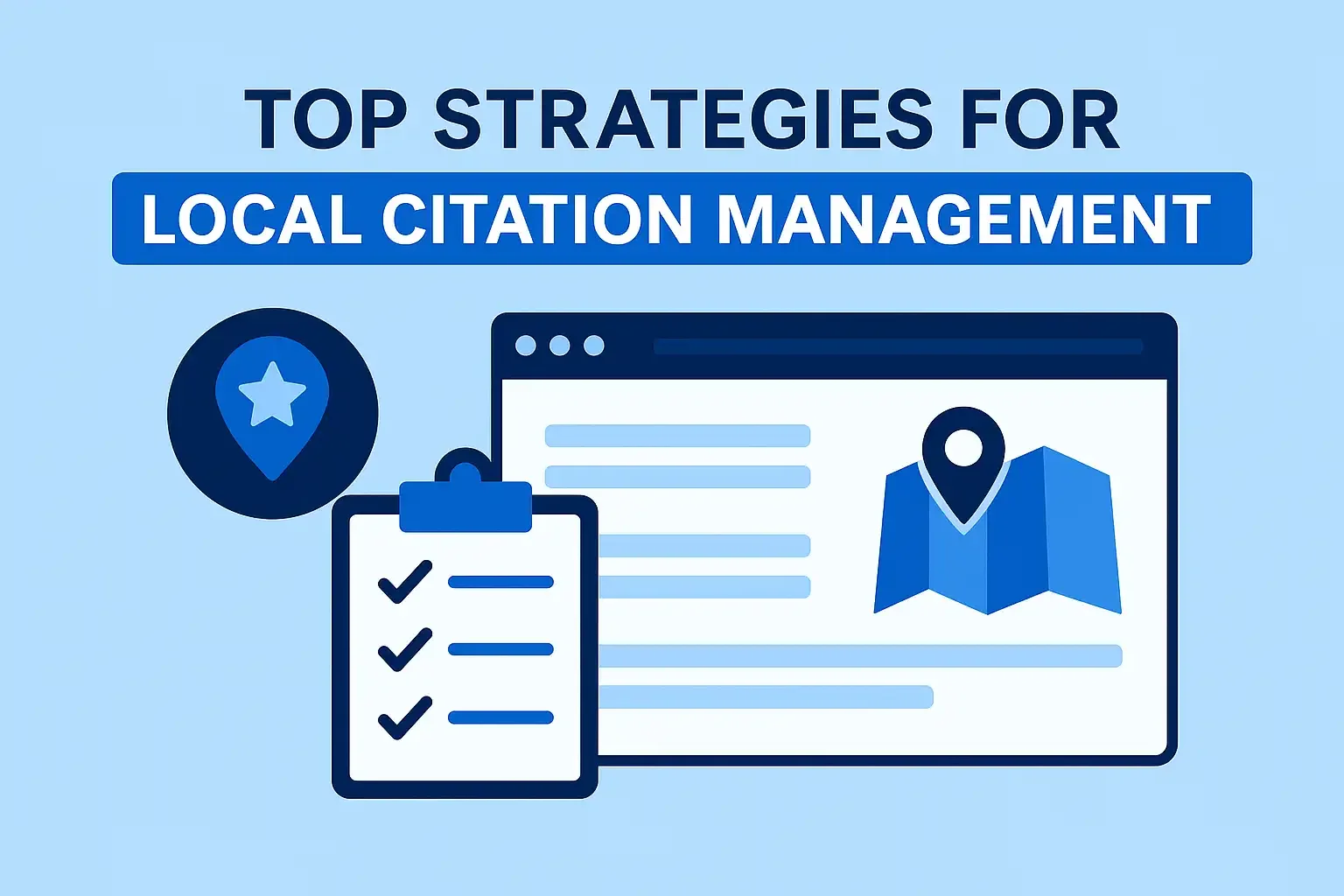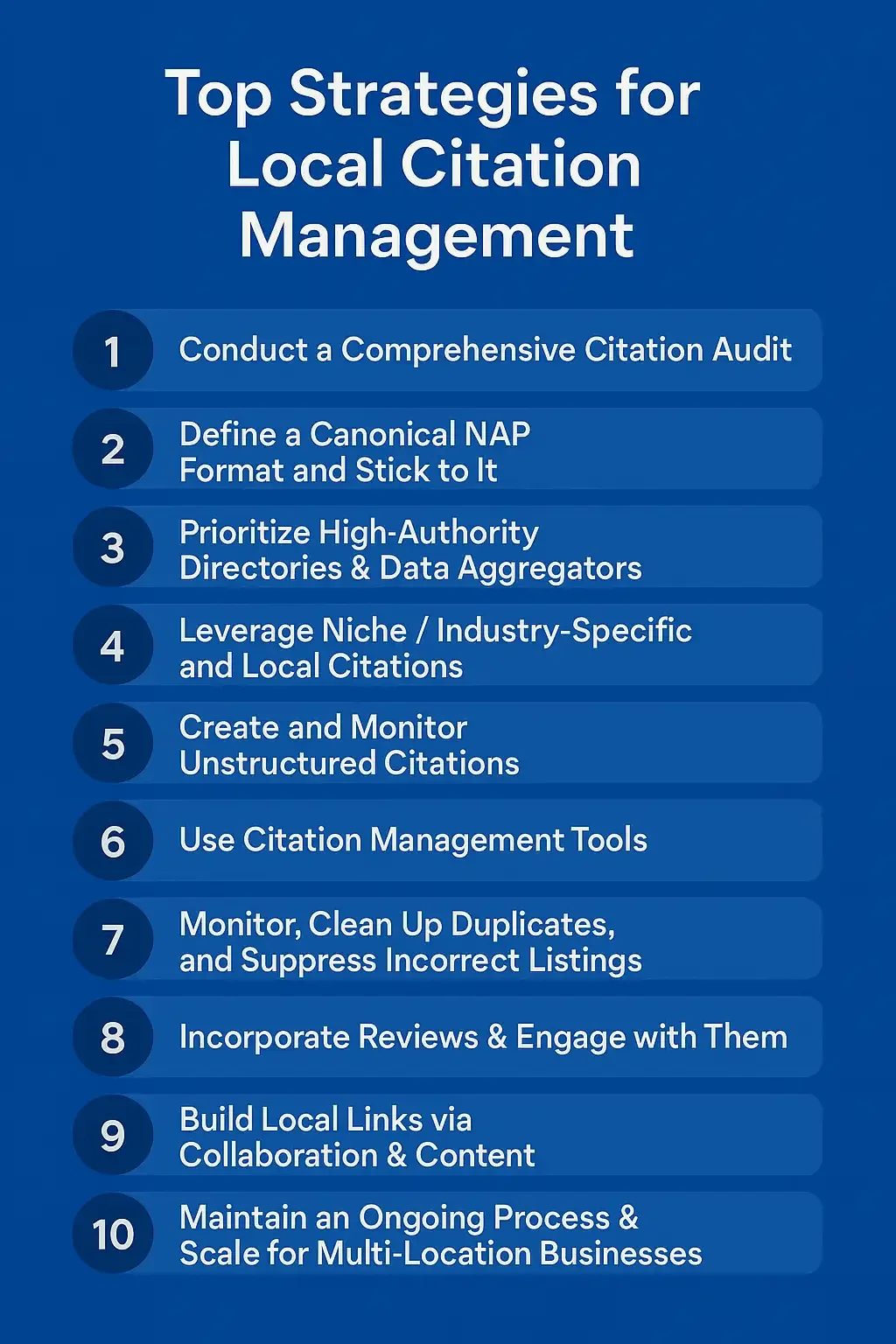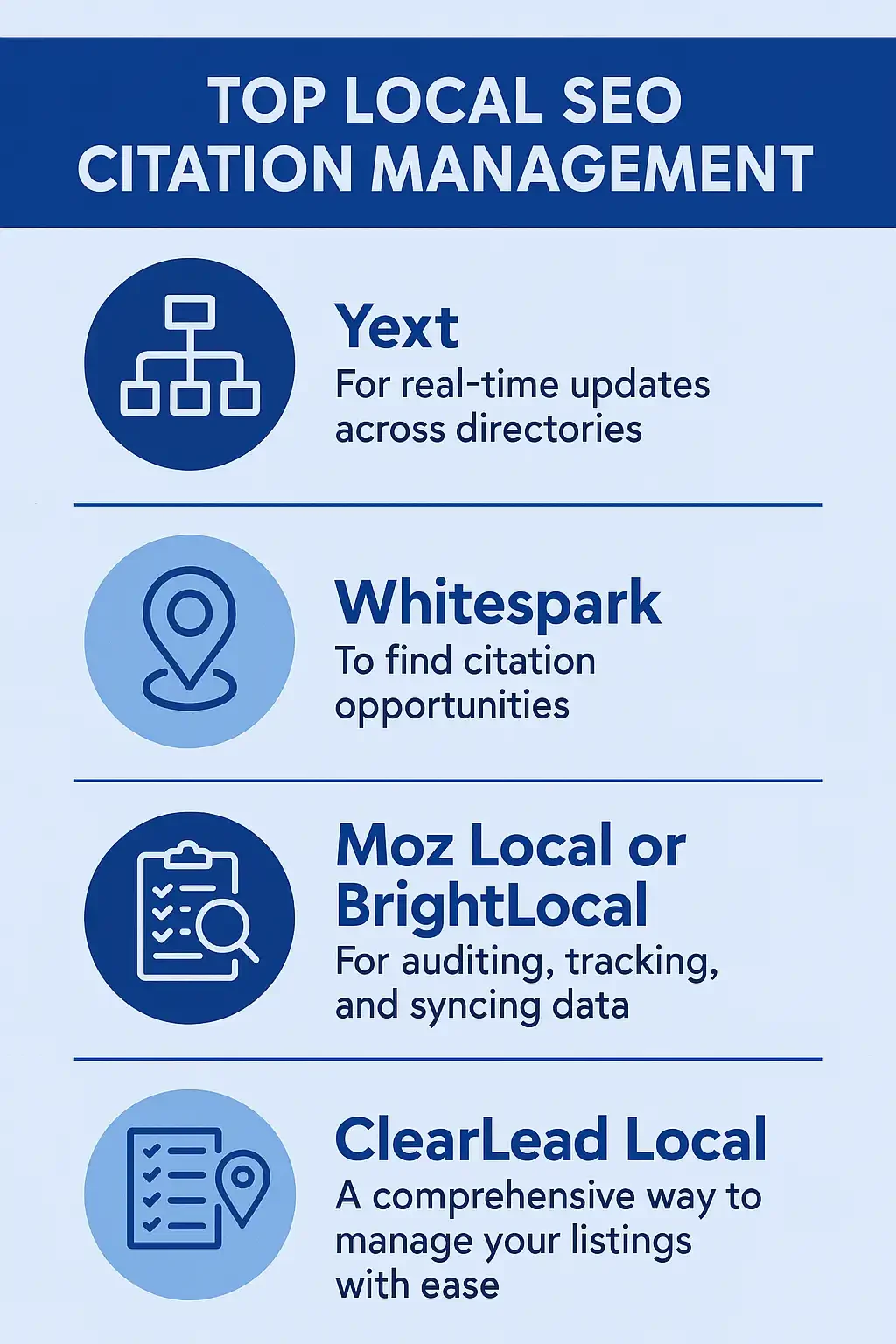Top Strategies for Local Citation Management
Last Updated: November 15, 2025
Local citation management (LCM) is one of the most powerful yet overlooked pillars of local SEO. This guide walks you through proven local SEO strategies to build, audit, and maintain consistent business listings across directories, data aggregators, and local platforms. Whether managing a single location or multiple markets, you’ll learn how to enhance visibility, eliminate duplicates, and strengthen your local ranking signals.
Table of Contents
Introduction
In today’s digital era, local businesses must ensure that their information is consistently and accurately displayed online. LCM is the process of keeping your business’s Name, Address, and Phone number (NAP) consistent. This is very important for your local SEO strategy.
Citations validate your business for search engines, helping you appear in Google’s local pack and on maps. Inconsistent or inaccurate citations can cause confusion for both users and search engines, hurting your rankings.
Search engines rely on consistent citation signals to verify the legitimacy of a business. When your NAP data matches in different directories, it boosts your credibility. This also helps you rank in the local pack, which is the top three map listings every business wants to be in.
For property managers, restaurants, and service companies, managing local citations is very important. It can help them attract local clients instead of hiding from competitors.
What Are Local Citations?
Local citations are online mentions of your business’s NAP information on directories, websites, or social media platforms. They can also include your business hours, website URL, photos, and services.
Accurate citations boost trust with Google and enhance your chances of ranking higher in local search results. When you build local citations your build credibility.
Types of Local Citations
Structured Citations
Appear in standardized business directories such as:
Google Business Profile
Yelp
Bing Places
TripAdvisor
Yellow Pages
These listings follow a uniform format and typically include your NAP, website, and category.
Unstructured Citations
Appear in:
News articles
Blogs
Local business mentions
Social media posts
Online reviews
These may not follow a standard format but still help establish your business’s presence and authority.
A structured citation may show up on your Yelp profile. An unstructured citation could be a newspaper article that mentions your business. Both are important — structured citations improve data accuracy, and unstructured ones boost brand authority.
Top Strategies for Citation Management
1. Conduct a Comprehensive Citation Audit
Start by auditing your existing listings. Use tools like Moz Local, BrightLocal, or Whitespark to identify where your business appears online. Record inconsistencies or outdated data, then remove duplicates or incorrect listings.
A clean foundation prevents confusion and ensures future updates sync correctly.
2. Define a Canonical NAP Format and Stick to It
Consistency is everything.
Define your official business name, address, and phone number — for example:
ClearLead Digital, 6441 South Chickasaw Trail #321 - Orlando, FL 32829
Use this exact format everywhere, from your Google Business Profile to your website footer and invoices. Even small variations like “Street” vs. “St.” can hurt local ranking signals. Keep a master document to ensure uniform updates.
3. Prioritize High-Authority Directories & Data Aggregators
Submit and maintain your business data on:
Google Business Profile
Apple Maps
Yelp
Facebook
Bing Places
Also, list on major data aggregators such as Factual, Infogroup, and Localeze. These platforms distribute your details to hundreds of smaller directories, ensuring widespread accuracy and reach.
4. Leverage Niche / Industry-Specific and Local Citations
Don’t just focus on the big sites. Find directories and associations specific to your industry or city:
Industry (law, dental, home inspector, HVAC, real estate, etc.)
City or region (e.g., “Best Businesses in San Antonio” “Miami Local Services”)
Associations and Chamber of Commerce
These niche citations send powerful local signals to Google.
5. Create and Monitor Unstructured Citations
Unstructured citations appear naturally across the web:
Local blogs mentioning your business
Event sponsorships or community pages
Local news features
Social media mentions
Unstructured citations occur naturally online — think local news features, event sponsorships, or community websites.
Sponsor a charity, support a local event, or collaborate with another business to earn organic mentions. Tools like Google Alerts or Brand24 can help you track these mentions and correct inaccuracies.
6. Use Citation Management Tools
Manual management works for single locations, but automation saves time at scale.
Popular tools include:
Yext – for real-time updates across directories
Whitespark – to find citation opportunities
SEO Moz Citations, Moz Local Directory or BrightLocal – for auditing, tracking, and syncing data
ClearLead Local - a comprehensive way to manage your listings with ease
These tools keep your information consistent and reduce manual errors.
7. Monitor, Clean Up Duplicates, and Suppress Incorrect Listings
Duplicates or conflicting data can hurt rankings
Regularly scan for duplicates using audit tools.
Merge or remove redundant listings.
Contact directory owners to delete outdated information.
This keeps your NAP data consistent across all platforms. This way, potential customers can easily find you, your product, or your service.
8. Incorporate Reviews & Engage with Them
Reviews are part of your citation ecosystem.
Encourage satisfied customers to leave reviews on Google, Yelp, or industry-specific sites.
Respond to all reviews professionally.
Use reviews in your website’s structured data (Schema markup) to boost local SEO.
9. Build Local Links via Collaboration & Content
Combine citation management with local link-building:
Partner with local events, charities, and news outlets.
Guest post on local blogs or directories.
List yourself in community guides.
Always include your consistent NAP when mentioned.
These build trust and authority within your local community.
10. Maintain an Ongoing Process & Scale for Multi-Location Businesses
Citation management isn’t one-and-done:
Schedule quarterly audits.
Update all listings when business info changes.
For multi-location brands, create location-specific pages and track citations separately.
Continuous monitoring ensures accuracy and long-term SEO success.
Top 10 Tips for Local Citations
Always Match Your NAP Exactly – Even minor differences (e.g., “Suite 200” vs. “#200”) can hurt your rankings.
Update Immediately After Changes – If you move offices or switch phone providers, update citations right away.
Prioritize Consistency Over Quantity – Ten consistent listings beat fifty with errors.
Don’t Ignore Small Directories – Local Chamber, city guides, and regional directories can drive targeted traffic.
Use Tracking Numbers Wisely – If using call tracking, configure it with Dynamic Number Insertion (DNI) to preserve NAP consistency.
Monitor for Duplicates Monthly – Especially on platforms like Yelp or Apple Maps that often create automated duplicates.
Claim and Verify Your Listings – Always claim ownership to gain control and prevent edits by third parties.
Encourage Reviews on Citation Sites – Google favors businesses with consistent NAP data and strong review activity.
Add Rich Media Where Possible – Upload photos, logos, and business hours to increase engagement and trust.
Use a Tool Like ClearLead Local – Centralize your management to monitor, update, and synchronize listings across 40+ directories automatically.
What Doing It Right Can Do for You
When you manage your local citations well, the benefits extend beyond just cleaner listings. It also improves your visibility, trust, and conversions. Here’s what you can expect when you have consistent business information across all citations:
1. Improved Local Search Rankings
Search engines like Google reward accuracy. Consistent citations show that your business is real and active. This helps you get into the Local 3-Pack, which is the top map results that most customers click on first.
2. Stronger Brand Credibility
Customers trust what they see repeatedly. When your business details are the same on Google, Yelp, Bing, and social media, it builds trust. This makes your brand look reliable and professional.
3. More Traffic — Both Online and In-Person
Accurate listings help customers find you faster — whether that’s your website, phone number, or physical location. It reduces confusion, missed calls, and lost sales opportunities.
4. Better Review Visibility and Engagement
When your NAP data and profiles are unified, your reviews also sync more effectively across platforms. That means people see your best testimonials more often, which reinforces your reputation and boosts conversion rates.
5. Easier Multi-Location Management
For brands with multiple offices or service areas, proper citation management makes it simple to maintain uniformity. You can manage the visibility of each location from one dashboard. This way, no branch will be left behind.
6. Long-Term SEO Stability
Citation management isn’t just a quick boost — it’s a compounding SEO investment. Keeping your business data clean and consistent helps protect your rankings. This prevents sudden drops from mismatched or outdated information.
Conclusion & Key Takeaways
Effective LCM builds trust with search engines and customers alike.
By keeping your NAP accurate, eliminating duplicates, and leveraging powerful directories, you enhance visibility, credibility, and conversions.
Key Takeaway:
“Accuracy + Consistency + Monitoring = Strong Local SEO Performance.”
Stay proactive and your business will dominate local search results.
Local citation management is more than an SEO checklist — it’s a long-term investment in visibility and reputation.
ClearLead Local helps you keep your listings correct and consistent on over 40 major platforms. This way, customers can find your business wherever they search.
Want your business to show up everywhere your customers search?
ClearLead Local keeps your listings accurate, consistent, and visible — across Google, Yelp, Bing, and 40+ directories.
🔍 Get Started with ClearLead LocalFrequently Asked Questions (FAQs)
-
A local citation is any online mention of your business’s name, address, and phone number (NAP). These help search engines verify your business’s legitimacy and improve local rankings.
-
Accurate citations boost trust and visibility. Inconsistent or incorrect listings can confuse Google, leading to lower rankings and lost customers.
-
Use tools like ClearLead Local, Moz Local, BrightLocal, or Whitespark. These tools help you find all your business citations. They also help you spot outdated or duplicate entries.
-
Quality matters more than quantity. Start with top directories (Google, Yelp, Bing) and a few niche/local platforms. Regularly maintain and monitor them for accuracy.
-
Review citations every 3–6 months, or immediately after changes to your business info (address, phone number, hours, etc.).
-
Yes! Platforms like Facebook, LinkedIn, and Instagram count as unstructured citations and support your local SEO footprint.
-
Duplicate listings confuse search engines and may dilute your SEO authority. Always delete or merge duplicates using platform tools or manual requests.
-
You can find structured citations in formal directories like Yelp and Google Business Profile. Unstructured citations are casual mentions on blogs or social media.
-
Absolutely. Consistent NAP data helps voice assistants like Siri, Alexa, and Google Assistant give accurate results. This happens when users ask for “businesses near me.”
-
Popular tools include:
ClearLead Local
Yext
Moz Local
BrightLocal
Whitespark
Synup
These platforms simplify finding, fixing, and syncing your business data across multiple directories.



